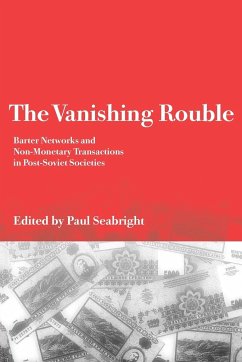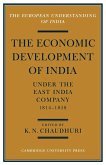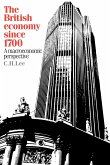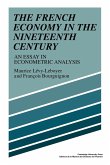Paul Seabright (ed.)Barter Networks and Non-Monetary Transactions in Post-Soviet Societies
The Vanishing Rouble
Barter Networks and Non-Monetary Transactions in Post-Soviet Societies
Herausgeber: Seabright, Paul
Paul Seabright (ed.)Barter Networks and Non-Monetary Transactions in Post-Soviet Societies
The Vanishing Rouble
Barter Networks and Non-Monetary Transactions in Post-Soviet Societies
Herausgeber: Seabright, Paul
- Broschiertes Buch
- Merkliste
- Auf die Merkliste
- Bewerten Bewerten
- Teilen
- Produkt teilen
- Produkterinnerung
- Produkterinnerung
An accessible and authoritative analysis of barter in the former Soviet Union.
Andere Kunden interessierten sich auch für
![The Economy of Early Renaissance Europe, 1300 1460 The Economy of Early Renaissance Europe, 1300 1460]() Harry A. MiskiminThe Economy of Early Renaissance Europe, 1300 146044,99 €
Harry A. MiskiminThe Economy of Early Renaissance Europe, 1300 146044,99 €![Ecology and Exchange in the Andes Ecology and Exchange in the Andes]() Ecology and Exchange in the Andes60,99 €
Ecology and Exchange in the Andes60,99 €![The Economic Development of India Under the East India Company 1814 58 The Economic Development of India Under the East India Company 1814 58]() K. N. ChaudhuriThe Economic Development of India Under the East India Company 1814 5844,99 €
K. N. ChaudhuriThe Economic Development of India Under the East India Company 1814 5844,99 €![After the Great Recession After the Great Recession]() After the Great Recession55,99 €
After the Great Recession55,99 €![The British Economy Since 1700 The British Economy Since 1700]() C. H. LeeThe British Economy Since 170025,99 €
C. H. LeeThe British Economy Since 170025,99 €![Europe, America, and the Wider World Europe, America, and the Wider World]() William Nelson ParkerEurope, America, and the Wider World36,99 €
William Nelson ParkerEurope, America, and the Wider World36,99 €![The French Economy in the Nineteenth Century The French Economy in the Nineteenth Century]() Maurice Levy-LeboyerThe French Economy in the Nineteenth Century43,99 €
Maurice Levy-LeboyerThe French Economy in the Nineteenth Century43,99 €-
-
-
An accessible and authoritative analysis of barter in the former Soviet Union.
Hinweis: Dieser Artikel kann nur an eine deutsche Lieferadresse ausgeliefert werden.
Hinweis: Dieser Artikel kann nur an eine deutsche Lieferadresse ausgeliefert werden.
Produktdetails
- Produktdetails
- Verlag: Cambridge University Press
- Seitenzahl: 402
- Erscheinungstermin: 1. April 2011
- Englisch
- Abmessung: 229mm x 152mm x 24mm
- Gewicht: 650g
- ISBN-13: 9780521795425
- ISBN-10: 0521795427
- Artikelnr.: 21640661
- Herstellerkennzeichnung
- Libri GmbH
- Europaallee 1
- 36244 Bad Hersfeld
- gpsr@libri.de
- Verlag: Cambridge University Press
- Seitenzahl: 402
- Erscheinungstermin: 1. April 2011
- Englisch
- Abmessung: 229mm x 152mm x 24mm
- Gewicht: 650g
- ISBN-13: 9780521795425
- ISBN-10: 0521795427
- Artikelnr.: 21640661
- Herstellerkennzeichnung
- Libri GmbH
- Europaallee 1
- 36244 Bad Hersfeld
- gpsr@libri.de
Introduction: barter networks and information islands Paul Seabright; Part
I. Theory: 1. Some lasting thing: barter and the value of money Jayasri
Dutta; 2. Barter Relationships Canice Prendergast and Lars Stole; 3. An
anthropological view of barter in Russia Caroline Humphrey; Part II. Large
Scale Empirical Studies: 4. Barter in post-Soviet societies: what does it
look like and why does it matter? Alena Ledeneva and Paul Seabright; 5.
Different types of non-monetary transaction in Russia Simon Commander and
Christian Mummsen; 6. Barter in Russia Sergei Guriev and Barry W. Ickes; 7.
The household in a non-monetary market economy Simon Clarke; 8. Barter in
transition economies: competing explanations confront Ukrainian data Dalia
Marin, Daniel Kaufmann and Bogdan Gorochowskij; 9. Barter and non-monetary
transactions in transition economies: evidence from a cross-country survey
Wendy Carlin, Steven Fries, Mark Schaffer and Paul Seabright; Part III.
Ethnography: 10. How is barter done? The social relations of barter in
provincial Russia Caroline Humphrey; 11. Shadow barter: economic necessity
or economic crime? Alena Ledeneva; 12. Surrogate currencies and the wild
market in Central Siberia David G. Anderson; 13. Bear skins and macaroni:
the social life of things at the margins of a Siberian state collective
Nikolai Ssorin-Chaikov; Conclusion: what is to be done? Paul Seabright and
Simon Commander.
I. Theory: 1. Some lasting thing: barter and the value of money Jayasri
Dutta; 2. Barter Relationships Canice Prendergast and Lars Stole; 3. An
anthropological view of barter in Russia Caroline Humphrey; Part II. Large
Scale Empirical Studies: 4. Barter in post-Soviet societies: what does it
look like and why does it matter? Alena Ledeneva and Paul Seabright; 5.
Different types of non-monetary transaction in Russia Simon Commander and
Christian Mummsen; 6. Barter in Russia Sergei Guriev and Barry W. Ickes; 7.
The household in a non-monetary market economy Simon Clarke; 8. Barter in
transition economies: competing explanations confront Ukrainian data Dalia
Marin, Daniel Kaufmann and Bogdan Gorochowskij; 9. Barter and non-monetary
transactions in transition economies: evidence from a cross-country survey
Wendy Carlin, Steven Fries, Mark Schaffer and Paul Seabright; Part III.
Ethnography: 10. How is barter done? The social relations of barter in
provincial Russia Caroline Humphrey; 11. Shadow barter: economic necessity
or economic crime? Alena Ledeneva; 12. Surrogate currencies and the wild
market in Central Siberia David G. Anderson; 13. Bear skins and macaroni:
the social life of things at the margins of a Siberian state collective
Nikolai Ssorin-Chaikov; Conclusion: what is to be done? Paul Seabright and
Simon Commander.
Introduction: barter networks and information islands Paul Seabright; Part
I. Theory: 1. Some lasting thing: barter and the value of money Jayasri
Dutta; 2. Barter Relationships Canice Prendergast and Lars Stole; 3. An
anthropological view of barter in Russia Caroline Humphrey; Part II. Large
Scale Empirical Studies: 4. Barter in post-Soviet societies: what does it
look like and why does it matter? Alena Ledeneva and Paul Seabright; 5.
Different types of non-monetary transaction in Russia Simon Commander and
Christian Mummsen; 6. Barter in Russia Sergei Guriev and Barry W. Ickes; 7.
The household in a non-monetary market economy Simon Clarke; 8. Barter in
transition economies: competing explanations confront Ukrainian data Dalia
Marin, Daniel Kaufmann and Bogdan Gorochowskij; 9. Barter and non-monetary
transactions in transition economies: evidence from a cross-country survey
Wendy Carlin, Steven Fries, Mark Schaffer and Paul Seabright; Part III.
Ethnography: 10. How is barter done? The social relations of barter in
provincial Russia Caroline Humphrey; 11. Shadow barter: economic necessity
or economic crime? Alena Ledeneva; 12. Surrogate currencies and the wild
market in Central Siberia David G. Anderson; 13. Bear skins and macaroni:
the social life of things at the margins of a Siberian state collective
Nikolai Ssorin-Chaikov; Conclusion: what is to be done? Paul Seabright and
Simon Commander.
I. Theory: 1. Some lasting thing: barter and the value of money Jayasri
Dutta; 2. Barter Relationships Canice Prendergast and Lars Stole; 3. An
anthropological view of barter in Russia Caroline Humphrey; Part II. Large
Scale Empirical Studies: 4. Barter in post-Soviet societies: what does it
look like and why does it matter? Alena Ledeneva and Paul Seabright; 5.
Different types of non-monetary transaction in Russia Simon Commander and
Christian Mummsen; 6. Barter in Russia Sergei Guriev and Barry W. Ickes; 7.
The household in a non-monetary market economy Simon Clarke; 8. Barter in
transition economies: competing explanations confront Ukrainian data Dalia
Marin, Daniel Kaufmann and Bogdan Gorochowskij; 9. Barter and non-monetary
transactions in transition economies: evidence from a cross-country survey
Wendy Carlin, Steven Fries, Mark Schaffer and Paul Seabright; Part III.
Ethnography: 10. How is barter done? The social relations of barter in
provincial Russia Caroline Humphrey; 11. Shadow barter: economic necessity
or economic crime? Alena Ledeneva; 12. Surrogate currencies and the wild
market in Central Siberia David G. Anderson; 13. Bear skins and macaroni:
the social life of things at the margins of a Siberian state collective
Nikolai Ssorin-Chaikov; Conclusion: what is to be done? Paul Seabright and
Simon Commander.








